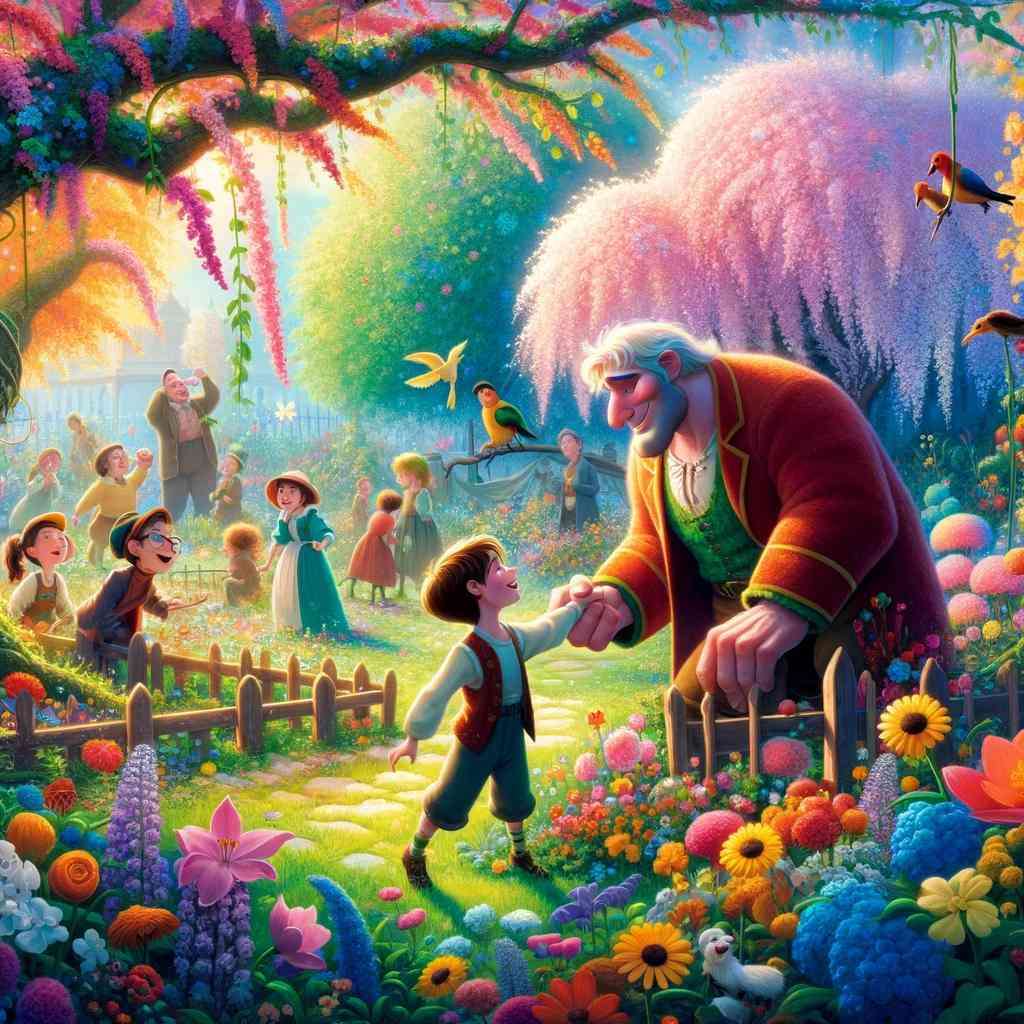The Selfish Giant is a famous fairy tale by Oscar Wilde, first published in 1888 as part of his collection, “The Happy Prince and Other Tales”. Here’s a short retelling of this beloved story, staying true to Wilde’s original narrative:
Once upon a time, in a small village, there was a beautiful garden that belonged to a giant. This garden was a children’s paradise with soft, green grass; fragrant flowers; and fruit trees with shiny, delicious fruits. Every afternoon, after school, the children would go to the giant’s garden and play until evening.
But, the giant had been away for seven years visiting his friend, the Cornish ogre, and when he returned, he was displeased to see the children playing in his garden. In a booming voice, he declared, “What are you doing here?” The children ran in terror.
Furious at the intrusion, the giant built a high wall around his garden and put up a notice: “TRESPASSERS WILL BE PROSECUTED.” He wanted the garden all to himself.
From that day, the garden plunged into a perpetual winter. Spring did not visit the giant’s garden; neither did summer. The birds did not care to sing in it as there were no children, and the trees forgot to blossom. The only ones pleased were the Snow and the Frost.
One morning, the giant was lying awake in bed when he heard some lovely music. It sounded so sweet to his ears that he thought it must be the King’s musicians passing by.
It was, in fact, only a little linnet singing outside his window, but it was so long since he had heard a bird sing in his garden that it seemed to him to be the most beautiful music in the world.
He looked out and saw a wonderful sight. Through a small hole in the wall, the children had crept in, and they were sitting in the branches of the trees. In every tree that he could see, there was a little child.
And the trees were so glad to have the children back again that they had covered themselves with blossoms, and were waving their arms gently above the children’s heads.
The birds were fluttering and twittering with delight, and the flowers were looking up through the green grass and laughing. It was a lovely scene, only in one corner, it was still winter.
It was the farthest corner of the garden, and in it was standing a little boy. He was so small that he could not reach up to the branches of the tree, and he was wandering all around it, crying bitterly.
The poor tree was still quite covered with frost and snow, and the North Wind was blowing and roaring above it. “Climb up! little boy,” said the tree, and it bent its branches down as low as it could; but the boy was too tiny.
And the giant’s heart melted as he looked out. “How selfish I have been!” he said; “now I know why the Spring would not come here.
I will put that poor little boy on the top of the tree, and then I will knock down the wall, and my garden shall be the children’s playground forever and ever.” He was really very sorry for what he had done.
So he crept downstairs and opened the front door quite softly, and went out into the garden. But when the children saw him, they were so frightened that they all ran away, and the garden became winter again. Only the little boy did not run, for his eyes were so full of tears that he did not see the giant coming.
And the giant stole up behind him and took him gently in his hand, and put him up into the tree. And the tree broke at once into blossom, and the birds came and sang on it, and the little boy stretched out his two arms and flung them round the giant’s neck, and kissed him.
And the other children, when they saw that the giant was not wicked any longer, came running back, and with them came the Spring.
“It is your garden now, little children,” said the giant, and he took a great axe and knocked down the wall. And when the people were going to market at twelve o’clock they found the giant playing with the children in the most beautiful garden they had ever seen.
All day long they played, and in the evening they came to the giant to bid him goodbye. “But where is your little companion?” he said: “the boy I put into the tree.” The giant loved him the best because he had kissed him.
“We don’t know,” answered the children; “he has gone away.”
“You must tell him to be sure and come here tomorrow,” said the giant. But the children said that they did not know where he lived, and had never seen him before; and the giant felt very sad.
Every afternoon, when school was over, the children came and played with the giant. But the little boy whom the Giant loved was never seen again.
The giant felt a deep sense of longing for the little boy who had touched his heart. Days turned into weeks, and weeks into months, yet the boy did not return. The giant, once feared and selfish, had now become a friend to all the children in the village. His garden flourished like never before, but the joy it brought him was incomplete without the presence of the little boy.
One winter morning, as the first snowflakes began to fall, the giant noticed something remarkable. In the very corner of the garden where he had first seen the little boy, a golden tree had sprung up, its branches heavy with white blossoms. It was unlike any tree the giant or the villagers had ever seen.
As he approached the tree, he saw the little boy standing beneath it, his arms wide open, smiling. The giant ran towards him, his heart overflowing with joy. “You have come back!” he exclaimed.
The boy looked up at the giant with gentle eyes and said, “Yes, I have come to invite you to my garden.” The giant, puzzled, asked him where this garden was. The boy simply replied, “It is where we never feel sad, where the Spring never leaves, and where every heart is pure.”
The giant knelt down and embraced the boy, tears of happiness streaming down his face. As he stood up, he suddenly felt lighter, younger, and full of an inexplicable peace.
The children who had come to play in the garden saw the giant and the boy surrounded by a brilliant light. And in that instant, the giant transformed into a beautiful tree, tall and magnificent, standing beside the golden tree. The two trees stood there, side by side, their branches intertwined.
From that day on, the garden was even more magical. Flowers bloomed all year round, and laughter never ceased. The villagers said that the trees were the guardians of the garden, symbols of love and selflessness.
And so, the Selfish Giant’s heart, once encased in a wall of ice, was now part of a timeless tale of transformation and redemption, a testament to the power of kindness and the enduring magic of a child’s embrace. The garden remained a paradise, not just for children, but for all who sought the warmth of love and the joy of forgiveness.
Follow Up Questions
Here are three simple follow-up questions about the story “The Selfish Giant”:
What made the Selfish Giant’s garden bloom again after being in a perpetual winter?
Why did the Giant decide to knock down the wall around his garden?
What transformation did the Giant undergo at the end of the story?
Also Read: The Fairies


I understood that we should not be selfish ☺️☺️☺️.